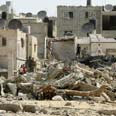
Rubble near Gaza battle zone
צילום:רויטרס
Rogue Gaza faction denies Qaeda link
Jund Ansar Allah, which declared Strip Islamic emirate and openly challenged Hasmas government, says after bloody clashes 'those who call for protection of blood of Hamas leaders should remain neutral.' Expert: Strip incubator for growth of extremist tendencies
Hamas may have buried the radical Islamist group that brazenly challenged its control over the Gaza Strip, but its rule of the Palestinian territory is indirectly encouraging extremism, experts say.
While Hamas's largely nationalistic agenda and interpretation of Islam enjoys widespread appeal, it also encourages some of Gaza's weary, war-shocked residents to outflank it with more radical ideologies and tactics.
On Friday scores of followers of Jund Ansar Allah -- Soldiers of the Partisans of God -- openly brandished weapons in a mosque in the southern Gaza city of Rafah and declared an Islamic emirate in a direct challenge to the Hamas-run government.
Within hours clashes erupted that would eventually kill 24 people, including several Hamas policemen and the top two leaders of the group, which was seen as inspired by Osama bin Laden's global Al-Qaeda terror network but has denied any link.
"The Gaza Strip has been transformed into a greenhouse and an incubator for the growth of extremist and hardline tendencies," says Naji Shirab, a professor of political science at Gaza's Al-Azhar University.
"It is in the nature of these groups to reject the established political reality and to make it more extreme. They think that if Hamas is an Islamic movement then it must implement Islamic law."
Although Hamas espouses an Islamist ideology it has taken only limited steps towards imposing Islamic law on Gaza since it seized power in the impoverished enclave of 1.5 million people in June 2007.
That has led more extreme elements inside the besieged territory -- radicalized in part by years of war with Israel and grinding poverty -- to accuse Hamas of betraying Islam and to openly challenge its rule.
'Battle to establish sharia has begun'
Iyad Barghuti, director of the Ramallah Centre for the Study of Human Rights, says Hamas is "besieged in two ways," both by crippling Israeli sanctions and by its own ideological identity.
"The problem is that its people are strictly religious, and when they see that their leaders are less strict than them they demand that they implement sharia (Islamic Law)."
In a statement on Sunday after the fighting had ended Jund Ansar Allah said: "The battle to establish sharia has begun and will not end until its complete establishment as it was given to us by God.
"All those who would call for the protection of the blood of Hamas leaders should remain neutral if they do not want to end up in (our) trenches."
Hamas, which has always focused its fight on Israel, has long rejected Al-Qaeda's call for a global war against non-Muslims and perceived heretics.
However since seizing power it has mostly turned a blind eye to Gaza's home-grown Qaeda-style groups, and has even formed temporary alliances with them.
But Jund Ansar Allah has denied links to Al-Qaeda, according to a statement carried on Monday by the monitoring group SITE Intelligence.
"We are not followers of Al-Qaeda" contrary to Hamas propaganda "that we are Al-Qaeda and apostate-branders," the statement said.
In 2006 Hamas fighters captured Israeli soldier Gilad Shalit in a deadly cross-border raid launched in collaboration with the Army of Islam, a Qaeda-inspired group, and another smaller faction.
The following year, when the Army of Islam kidnapped British journalist Alan Johnston of the BBC, Hamas pressured the group into releasing him.
Hamas faces a similar dilemma over rocket attacks on Israel -- seeing extreme Islamists as allies during times of fighting and a liability when it tries to enforce ceasefires.
In a recent interview with the Palestinian newspaper Al-Ayyam, a man calling himself Mahmud Talib and claiming to be a senior member of Jaljalat, another extreme Islamist group, described how Hamas made use of such groups.
"The Hamas movement has tried to gather the Salafist youth and channel their thinking towards fighting the (Israeli) occupation whenever they want and however they want in an unannounced way."
But despite Hamas's decision to halt rocket fire in an undeclared ceasefire with Israel, Talib said his group hopes to carry out a spectacular attack to capture the attention of Bin Laden himself.
Meanwhile groups such as his are believed to have firebombed Internet cafes and threatened Christians and women who do not wear conservative Islamic dress.
Hamas has vowed to investigate these incidents but has made few if any arrests.
The complex relationship between Hamas and such groups mirrors that elsewhere in the Arab world between states that have supported radical Islamists only to see them turn their fury on their former patrons.
"The countries that fund these groups think they are funding moderate Salafist groups and they never know when these individuals will shift from missionary work to Jihad," Shirab says.
"I expect such violent incidents to spread... Despite Hamas's attempts to uproot these groups, they will not be able to completely control them."










